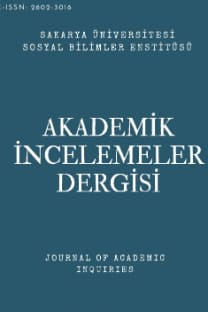Sosyo-Politik Gelişmişlik ve Çevre Göstergeleri
Sosyo-Politik Gelişmişlik, Çevre, Sosyal Politika, Endeks
Socio-Political Development and Environmental Indicators
Socio-Political Development, Environment, Social Policy, Index,
___
- Bergh, Jeroen C. J. M. van den. “The GDP Paradox”. Journal of Economic Psychology 30/2 (01 Nisan 2009), 117-135. https://doi.org/10.1016/j.joep.2008.12.001
- D.E.M.O.S. Beyond GDP: New Measures for a New Economy. DEMOS Reports”, 2012. http://www.demos.org/publication/beyond-gdp-newmeasures-new-economy
- Hafner, Kurt A. - Mayer-Foulkes, David. Dynamics, Economic Growth & International Trade. “Fertility, Economic Growth, and Human Development Causal Determinants of the Developed Lifestyle”. Journal of Macroeconomics 38 (01 Aralık 2013), 107-120. https://doi.org/10.1016/j.jmacro.2013.04.001
- Han, Ergül - Kaya, Ayten Ayşen. Kalkınma Ekonomisi: Teori ve Politika. Ankara: Nobel Akademik Yayıncılık, 10. Basım, 2021.
- Jardins, Joseph R. Des. Çevre Etiği / Çevre Felsefesine Giriş. çev. Ruşen Keleş. İmge Kitabevi Yayınları, 2006.
- Kayıkçı, Murat. Çevre ve Kalkınma Söylemi. Ankara: Orion Kitabevi, 2012.
- Marans, R.W. - Cooper, M. “Measuring the Quality of Community Life: A Program for Longitudinal and Comparative International Research”. International Conference on Quality of Life in Cities Singapore. Singapor, 2000.
- Ökmen, M. “Bir İnsan Hakkı Olarak Kentli Haklarının Geliştirilmesi ve Yerel Yönetimler”. Kentsel Dönüşüm ve İnsan Hakları. 17-43. İstanbul: İstanbul Bilgi Üniversitesi Yayınları, 2013.
- Özdemir, M. Ç. “Bütüncül Sosyal Politika Modeli”. Türk Dünyası Araştırmaları Dergisi 117/230 (2017), 27-44.
- Ponting, C. Dünyanın Yeşil Tarihi: Çevre ve Büyük Uygarlıkların Çöküşü. İstanbul: Sabancı Üniversitesi Yayınları, 3. Basım., 2012.
- Sen, Amartya. “Capability and Well‐Being”. The Quality of Life. ed. Martha Nussbaum - Amartya Sen. 0. Oxford University Press, 1993. https://doi.org/10.1093/0198287976.003.0003
- Better Life Index. Organization of Economic Cooperation and Development (OECD, 2016. http://www.oecdbetterlifeindex.org/topics/environment/,
- “Çevre ve Şehircilik Bakanlığı, KENTGES Uygulama ve Kentleri İzleme Sistemi”, 2012. http://www.kentges.gov.tr/HaberDetay.aspx?id=582,
- Çevresel Sağlık Kriterleri. World Health Organization, 2023. https://www.who.int/ipcs/publications/ehc/en/,
- Global Urban Indicators Database Version 2. United Nations Human Settlement Programme. United Nations Publications, 2001. http://www.cityindicators.org/Deliverables/Global%20Urban%20Indicators%20Data
- İllerde Yaşam Endeksi Hakkında Açıklamalar. Ankara: Türkiye İstatistik Kurumu, 2023.
- International Labour Organization (ILO). ILO, ts. www.ilo.org/global/abouttheilo/newsroom/features/WCMS_071230/langen/index.html
- “İstanbul Deklarasyonu: Herkes İçin Hakkaniyetli ve Sürdürülebilir Bir Geleceğe Doğru”. İstanbul: United Nations Development Programme (UNDP), 2012. http://www.tr.undp.org/content/turkey/tr/home/presscenter/pressreleases/global
- İşgücü İstatistikleri. Ankara: Türkiye İstatistik Kurumu, 2016. http://www.tuik.gov.tr/HbGetir.do?id=247481&tb_id=4,
- “Measuring Wellbeing And Progress”. Paris: Organization of Economic Cooperation and Development (OECD), 2013. http://www.oecd.org/std/Measuring%20WellBeing%20and%20Progress%20Brochur
- “Organization of Economic Cooperation and Development (OECD)”. OECD, 2016. http://www.oecd.org/about/,
- “The World’s Most Liveable Cities”. The Economist, 2023. http://www.economist.com/blogs/graphicdetail/2016/08/daily-chart-14,
- Yayın Aralığı: Yılda 2 Sayı
- Başlangıç: 2006
- Yayıncı: Sakarya Üniversitesi Sosyal Bilimler Enstitüsü
Afrika’da Kalkınmacı Devlet: Morityus Mucizesi
Stalin Dönemi (1928-53) Sovyet Tarih Yazımında Türkistan_Orta Asya
Sosyo-Politik Gelişmişlik ve Çevre Göstergeleri
Rusya - Ukrayna Çatışmasında Medyada Üretilen İşgal Söylemine Etik Bağlamda Bir Eleştiri
Hüseyin ÇOTUR, Doç. Dr. Bora YENİHAN
Otantik Varoluş Biçiminin Bir Örneği Olarak Körkütük (2020) Filmi: Heideggerci Yaklaşım
Meltem İŞLER SEVİNDİ, Atilla AKALIN
Fiyat Arttırma ve Negatif Dengeleme Stratejileri Ekseninde Çin’in Körfez ve Suudi Arabistan Siyaseti
1845 Tarihli Temettuat Defterine Göre Ağsaklar/Aksaklar Köyü
Orna Donath. Annelikten Pişman Olmak (çev. Bilge Yalçın). İstanbul: İletişim Yayınları, 2022, 254 s.
Toplumsal Değişimde Göç Olgusunun Kültürel Güvenliğe Yansıması
